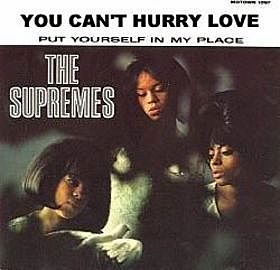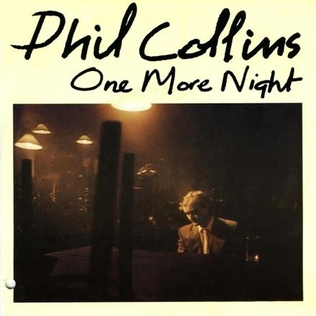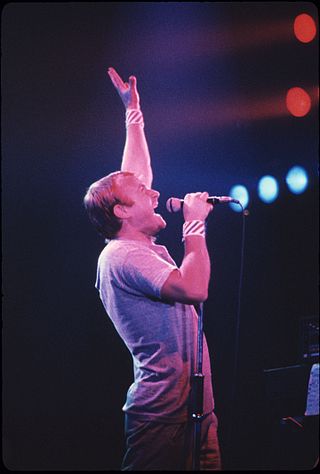
No Jacket Required is the third solo studio album by English drummer and singer-songwriter Phil Collins. It was released on 18 February 1985 by Virgin Records in the UK and by Atlantic and WEA internationally.

Hello, I Must Be Going! is the second solo studio album by English drummer and singer-songwriter Phil Collins. It was released on 5 November 1982 on Virgin Records in the United Kingdom and on Atlantic Records in North America, and named after the Marx Brothers' song of the same name. After Genesis took a break in activity in late 1981, Collins started work on a follow-up to his debut solo studio album Face Value (1981).

We Can't Dance is the fourteenth studio album by the English rock band Genesis, released on 11 November 1991 by Virgin Records in the UK and a day later by Atlantic Records in the US. It is their last studio album recorded with drummer and singer Phil Collins before his departure in 1996 to pursue solo projects full time. The album marked the return of band activity following an almost four-year hiatus after touring their previous album, Invisible Touch (1986).

Face Value is the debut solo studio album by English drummer and singer-songwriter Phil Collins, released on 13 February 1981 by Virgin Records in the United Kingdom and Atlantic Records in North America. After his first wife filed for divorce in 1979, Collins began to write songs during a break in activity from Genesis with much of the material concerning his personal life. The album was recorded from mid-1980 to early 1981 with Collins and Hugh Padgham as producers. Additional musicians include the Phenix Horns, Alphonso Johnson, and Eric Clapton.

...But Seriously is the fourth solo studio album by English drummer and singer-songwriter Phil Collins. It was released on 20 November 1989 in the United Kingdom by Virgin Records and by Atlantic Records in the United States. After Collins finished touring commitments with the rock band Genesis in 1987, the group entered a four-year hiatus, during which Collins starred in the feature film Buster (1988). By the spring of 1989, Collins had written material for a new solo album, which addressed more serious lyrical themes, like socio-economic and political issues, as opposed to his previous dance-oriented album, No Jacket Required (1985).

"You Can't Hurry Love" is a 1966 song originally recorded by the Supremes on the Motown label. It was released on July 25, 1966 as the second single from their studio album The Supremes A' Go-Go (1966).

Both Sides is the fifth solo studio album by English singer-songwriter Phil Collins. Featuring an adult-oriented soft rock-based sound, released on 8 November 1993 by Virgin in the UK and Atlantic in the US. Collins created the album entirely by himself, without any collaborations from outside songwriters and performers. The record received generally positive critical reviews, with Stephen Thomas Erlewine of AllMusic stating that the album's "artistically satisfying" songs feature "troubled, haunting tales".

Something's Going On is the third solo album by Swedish singer Anni-Frid Lyngstad (Frida), one of the founding members of the Swedish pop group ABBA, and her first album recorded entirely in English. Her previous two albums had been recorded in Swedish. Recorded in early 1982 during the final months of ABBA, the album was released on 10 September of that same year.

Testify is the seventh solo studio album by English musician Phil Collins, released on 11 November 2002. The album debuted at No. 30 on the US Billboard 200, which was also the album's peak position. It was also the second Phil Collins studio album where no track peaked within the American top 40 singles chart. It was also his lowest charting album in the UK, becoming his only solo effort not to reach the Top 5. However, the album achieved success in some countries of Continental Europe. It is his second album not to be co-produced by Hugh Padgham, who co-produced Collins' most successful albums.

"One More Night" is the first single in the United States and second in the United Kingdom from Phil Collins' third studio album, the Diamond-certified No Jacket Required. "One More Night" was Phil Collins' second U.S. No. 1 single, following "Against All Odds", and was his fourth single to reach the top ten in the UK, peaking at No. 4 on the UK Singles Chart. In the U.S., the single entered the Billboard Hot 100 at number 50 on the chart dated 9 February 1985. It hit number one seven weeks later and remained on top for two weeks. In the UK, the single was certified silver by the British Phonographic Industry. It was also his first No. 1 on the U.S. Adult contemporary chart.

English musician Phil Collins has released 8 studio albums, 1 live album, 5 compilation albums, 2 remix albums, 3 soundtrack albums, 2 box sets, 50 singles, 18 video albums, and 41 music videos. A Grammy and Academy Award-winning solo artist, Collins has sold more than 34.5 million albums in the United States, and 150 million records worldwide.

"Mama" is a song by the English rock band Genesis, released as the first single in 1983 from their self-titled album. It is recognisable for its harsh drum machine introduction composed by Mike Rutherford, which leads into minimalist synthesizer lines in a minor tonality and finally Phil Collins' reverb-laden voice. It remains the band's most successful single in the UK, peaking at No. 4 on the UK singles chart. It also made the top 10 in Switzerland, Austria, Norway, Ireland and the Netherlands. It was less popular in the US, only reaching No. 73 on the Billboard Hot 100. A 1992 re-release of the single managed to reach the Top 40 in Germany.

"Don't Let Him Steal Your Heart Away" is a song by Phil Collins from his second solo album Hello, I Must Be Going!. The song was the third single released from the album in the UK and charted at No. 45. It is notable for its 3D sleeve. The song was written around 1978-1979 during sessions for Face Value.

"Two Hearts" is a song by Phil Collins from the soundtrack to the film Buster (1988) where it features in the end credits, in which Collins played the lead role. The song was written and produced by Collins and Lamont Dozier. It reached number one in the United States and Canada in January 1989.

"Like China" is a song written and performed by the English singer and drummer Phil Collins from his second solo album Hello, I Must Be Going!. It was produced by Collins and Hugh Padgham.

Buster: The Original Motion Picture Soundtrack is the soundtrack for the 1988 British film Buster. The album was released on September 19, 1988. It is essentially a collection of oldies, tucked in between two Phil Collins songs that were recorded for the film, in which he starred. "Two Hearts" was specially written for the film, having earned a Grammy Award for Best Song Written Specifically for a Motion Picture or Television in 1989, a Golden Globe Award for Best Original Song as well as an Academy Award nomination for Best Original Song, and "A Groovy Kind of Love" with a Grammy Award nomination for Best Pop Vocal Performance, Male was a remake of a song taken to #2 in the UK Singles Chart in 1965 by The Mindbenders. Both were released as singles, and topped the Billboard Hot 100 chart, with "A Groovy Kind of Love" also reaching #1 in the UK. Other new songs include Collins' "Big Noise" and Four Tops' "Loco in Acapulco", co-written by Collins. At the Brit Awards in 1989 it won for Soundtrack/Cast Recording, while Collins received the award British Male Artist for his contribution to the soundtrack album.

"Tell Me Why" is a song by English rock band Genesis. It first appeared as the seventh track on their 14th studio album, We Can't Dance (1991), and was issued as a single in Europe in 1992 and in the United Kingdom on 8 February 1993 by Virgin Records. It was the last Genesis single featuring Phil Collins on vocals before leaving the group in March 1996.

"We Wait and We Wonder" is the third and final single by Phil Collins from his 1993 album Both Sides. It did not launch the album to the similar heights his previous efforts had achieved. It enjoyed similar success to the previous singles from the album, reaching number 45 on the UK Singles Chart, but failing to chart on the US Billboard Hot 100. It was his last single before the lead single of his next album Dance into the Light in 1996.
"I Can't Stop Loving You (Though I Try)" is a song written by singer-songwriter William Nicholls and first recorded by his short-lived project, White Horse – a collaboration between himself, Kenny Altman, and Jon Lind – and featured on the group's 1977 self-titled album.

"Turn It On Again" is a song by the English rock band Genesis featured on their 1980 album Duke. Also released as a single, the song reached number 8 in the UK Singles Chart, becoming the band's second top 10 hit. The lyrics, by Mike Rutherford, concern a man who does nothing more than watch television. He becomes obsessed with the people he watches on it, believing them to be his friends.



















